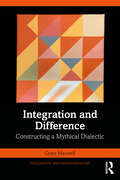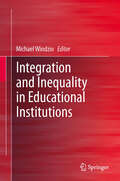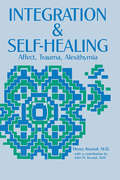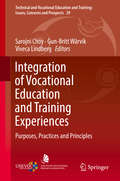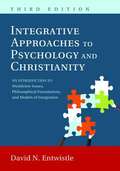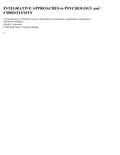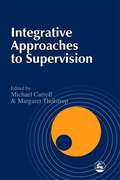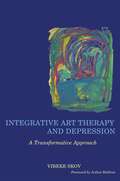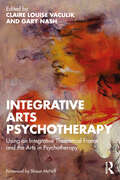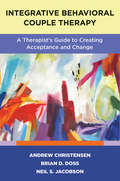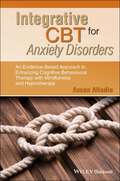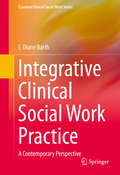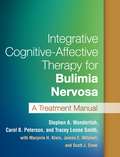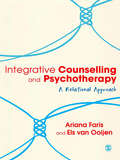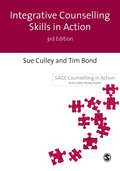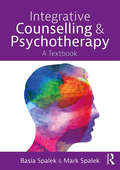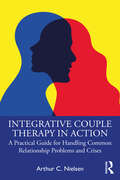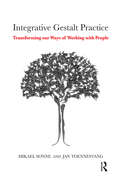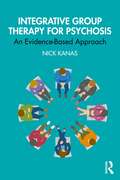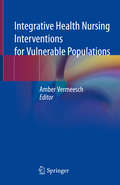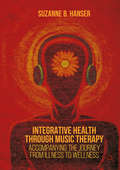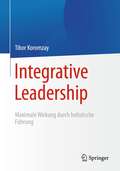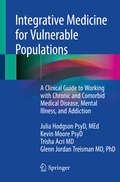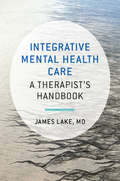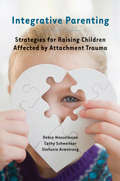- Table View
- List View
Integration and Difference: Constructing a Mythical Dialectic (Philosophy and Psychoanalysis)
by Grant MaxwellThis groundbreaking work synthesizes concepts from thirteen crucial philosophers and psychologists, relating how the ancient problem of opposites has been opening to an integration which not only conserves differentiation but enacts it, especially through the integration of myth into the dialectic. Weaving a fascinating narrative that ‘thinks with’ the complex encounters of theorists from Baruch Spinoza, G. W. F. Hegel, Friedrich Nietzsche, and William James to Alfred North Whitehead, C. G. Jung, Gilles Deleuze, and Isabelle Stengers, this book uniquely performs the convergence of continental philosophy, pragmatism, depth psychology, and constructivist ‘postmodern’ theory as a complement to the trajectory culminating in Jacques Derrida’s deconstruction. This is an important book for professionals and academics working across the humanities and social sciences, particularly for continental theorists and depth psychologists interested in the construction of a novel epoch after the modern.
Integration and Inequality in Educational Institutions
by Michael WindzioThis volume addresses questions that lie at the core of research into education. It examines the way in which the institutional embeddedness and the social and ethnic composition of students affect educational performance, skill formation, and behavioral outcomes. It discusses the manner in which educational institutions accomplish social integration. It poses the question of whether they can reduce social inequality, - or whether they even facilitate the transformation of heterogeneity into social inequality. Divided into five parts, the volume offers new insights into the many factors, processes and policies that affect performance levels and social inequality in educational institutions. It presents current empirical work on social processes in educational institutions and their outcomes. While its main focus is on the primary and secondary level of education and on occupational training, the book also presents analyses of institutional effects on transitions from vocational training into tertiary educational institutions in an interdisciplinary and internationally comparative approach.
Integration and Self Healing: Affect, Trauma, Alexithymia
by Henry KrystalFirst published in 1993. Aexithymia is the single most common cause of poor outcome or outright failure of psychoanalysis and psychoanalytic psychotherapy. The reason that this problem has escaped recognition for so long is part of the mystique and paradox of emotions. Affects are familiar to everyone. They are part of our experiences, so ordinary and common that they are equated with being human. The first part of this book is devoted to those mysterious and much studied experiences: emotions. The second part of the book concerns psychic trauma. Certain aspects of these two subjects have to be established in order to give us a broad enough view to approach the third subject: alexithymia.
Integration of Vocational Education and Training Experiences: Purposes, Practices and Principles (Technical and Vocational Education and Training: Issues, Concerns and Prospects #29)
by Sarojni Choy Gun-Britt Wärvik Viveca LindbergThis book draws on experiences from a range of vocational education systems in different nation states and re-examines the purpose of providing experiences outside educational institutions; the kinds and extent of those experiences; and efforts made to ensure the integration of students’ experiences across sites. Analyses of the various vocational education systems, their purposes and practices across nations, and challenges experienced by different stakeholders illustrate different approaches to the integration of learning at different sites. The book includes a consideration of what constitutes the integration and reconciliation of experiences, and their attendant educational implications. This extends an appraisal of the concepts of integration, reconciliation, curriculum and work readiness, each of which has a range of connotations. Integration or reconciliation is differentiated from transfer of learning, which is commonly based on simple assumptions that the educational institutions will provide theory and that the workplaces will provide practice from the workplaces, and that the two can be easily linked by students. The contributions from different nation states clearly demonstrate that integration is a collaborative process and requires the agency of stakeholders operating at global, national and specific learning site levels.
Integrative Approaches To Psychology And Christianity (Third Edition)
by David N. EntwistleProfessor David Entwistle's Integrative Approaches to Psychology and Christianity is now available in a fully revised 3rd edition. Changes and additions have made throughout this unique volume, including: * 42 additional pages * expanded list of models discussed * more questions for discussions, and * an updated bibliography. As disciplines, psychology and theology share an overlapping interest in the nature and functioning of human beings. This book provides an introduction to many of the worldview issues and philosophical foundations that frame the relationship of psychology and theology, includes scholarly reflection on the integration literature, and surveys five paradigms of possible relationships between psychology and Christianity. The book is designed to help readers become aware of the presuppositional backdrops that each of us brings to these issues, and to understand various approaches for relating psychology and Christianity as partly based on presuppositional assumptions. Questions at the end of each chapter are included to help readers evaluate both the material and their own burgeoning approach to integration. This book is ideal as a textbook for students of psychology and other behavioral and social sciences (social work, sociology, theology, counseling, pastoral counseling) at both the graduate and undergraduate level. It is also written for the broader readership of psychologists, counselors, pastors, and others who are interested in integration.
Integrative Approaches to Psychology and Christianity: An Introduction to Worldview Issues, Philosophical Foundations, and Models of Integration
by David N. EntwistleSince the first edition of Integrative Approaches to Psychology and Christianity was published in 2004, this has become the standard textbook on the topic. Now in its fully revised fourth edition, Dr. Entwistle’s book elucidates historical, philosophical, and practical issues in the integration of psychology and Christianity. <p><p>As in previous editions, the current text provides an introduction to many of the worldview issues and philosophical foundations that frame the relationship of psychology and theology, includes scholarly reflection on the integration literature, and surveys six models of possible relationships between psychology and Christianity, ranging from those that are completely opposed to either religion or psychology, to intermediate models that assert that some limited interaction between them is possible, to viewpoints which suggest that a Christian worldview approach can be used to provide a context for exploring areas of overlapping interest between psychology and Christianity. <p><p>The current edition considers recent advances in both Catholic and Protestant thinking on integration, including contemporary questions about what evangelicalism is (and is not) that shape evangelical reactions to the integration debate. New content ranges from information about the contrasting views of Tertullian and Augustine, to insights from contemporary psychology about factors that adversely affect the quality and reliability of human thinking, to how conflict over COVID-19 has entered contemporary religious debate. <p><p>The book is designed to help readers become aware of the presuppositional backdrops that each of us brings to these issues. Questions at the end of each chapter are included to help readers evaluate both the material and their own burgeoning approach to integration. This book is ideal as a textbook for students of psychology and other behavioral and social sciences (social work, sociology, theology, counseling, pastoral counseling) at both the graduate and undergraduate level. It is also written for the broader readership of psychologists, counselors, pastors, and others who are interested in integration.
Integrative Approaches to Supervision
by Charlotte Sills Michael Carroll Martin Milton Vanja Orlans Jane Speedy Brigid Proctor Penny Henderson Dagmar Edwards John Towler Jane Rosoman Maxine Dennis Rita Arundale Joanne Beazley-Richards Julie Hewson Val Wosket Harbrinder Dhillon-Stevens Graham Curtis Jenkins Margaret TholstrupAs new techniques and approaches to supervision attract interest within therapy-related professions, the contributors to this informative book consider the nature of a supervision and examine the ways in which it can be further defined and developed. Drawing together practical and theoretical perspectives, Integrative Approaches to Supervision examines the contribution that supervision can make within both organisational and individual settings. The book covers frameworks and models for supervision, supervision in clinical practice and issues within integrative supervision. Topics include: different models of the supervision practice; anti-oppressive practice; spirituality and supervision; counselling supervision in health care; supervision of organisations; self-protection for supervisors from complaints and litigation. Wide in scope but rich in detail, this book is essential reading for psychotherapists, counsellors, consultants and students involved in the supervision process.
Integrative Art Therapy and Depression: A Transformative Approach
by Vibeke Skov Arthur RobbinsLaying out a new integrative approach to the treatment of depression, this book looks at the biological, psychological, social and spiritual dimensions of clinical art therapy. Skov presents the theoretical foundation for a Jungian approach to art therapy and depression together with its clinical methodology and framework, outlining a procedure for working with people with mild to moderate depression. Integrative art therapy in clinical practice is introduced alongside case studies from the author's research and practice to show how transformative processes operate in the field between the conscious and the unconscious part of the psyche. Finally the author lays out her research methodology and discusses the possible implications of the integrative art therapy approach. This revolutionary approach, which places equal importance on both art therapy and psychology in the treatment of depression, will be a valuable resource for all art therapists and students working with clients and patients who suffer from depression. Psychologists, psychotherapists, counsellors and other mental health professionals will also find it of interest.
Integrative Arts Psychotherapy: Using an Integrative Theoretical Frame and the Arts in Psychotherapy
by Gary Nash Claire Louise VaculikThis book is a new addition to the art therapy literature setting out an integrative approach to using theory and the arts, which places clients at the centre of practice and supports collaboration across the therapeutic journey. The structural framework described enables different theories, contemporary research, and best-practice guidelines to be used to inform therapy, allowing the practitioner to work fluidly and rigorously in response to their clients’ changing needs and therapeutic aims. Integrative arts psychotherapy brings therapeutic practice to life, as the use of the visual arts is enhanced by the possibilities offered for developing and deepening therapeutic work using sculpture/clay, drama/puppetry, poetry, sand play, music, and bodywork/movement. The work described in this book has grown from a British and European art therapy culture, community, and history – influenced by prominent American theorists. The book has been written for trainers, trainees, and practitioners of creative arts therapies, psychotherapy, and expressive arts therapies – nationally and worldwide. It may also be of interest to other professionals, or those in consultation with an art therapist, who want to understand what this type of art therapy can offer.
Integrative Behavioral Couple Therapy: A Therapist's Guide To Creating Acceptance And Change, Second Edition
by Andrew Christensen Neil S. Jacobson Brian D. DossThe definitive therapist manual for Integrative Behavioral Couple Therapy (IBCT)—one of the most empirically supported approaches to couple therapy. Andrew Christensen, codeveloper (along with the late Neil Jacobson) of Integrative Behavioral Couple Therapy, and Brian Doss provide an essential manual for their evidence-based practice. The authors offer guidance on formulation, assessment, and feedback of couples’ distress from an IBCT perspective. They also detail techniques to achieve acceptance and deliberate change. In this updated edition of the work, readers learn about innovations to the IBCT approach in the 20+ years since the publication of the original edition—including refinements of core therapeutic techniques. Additionally, this edition provides new guidance on working with diverse couples, complex clinical issues, and integrating technology into a course of treatment.
Integrative CBT for Anxiety Disorders
by Assen AlladinIntegrative CBT for Anxiety Disorders applies a systematic integrative approach, Cognitive Hypnotherapy (CH), to the psychological treatment of anxiety disorders; it demonstrates how simple techniques can be used to create a therapeutic context within which CBT is more effective. An evidence-based approach to enhancing CBT with hypnosis and mindfulness when treating anxiety disorders shows how simple techniques can be used to create a therapeutic context within which CBT can become more effective Offers detailed and comprehensive coverage for practitioners, with specific protocols for each anxiety disorders covered and a hort case study per treatment chapter in order to demonstrate the approach in action Anxiety disorders is an area where the interaction between conscious and unconscious processes is especially important, and where the use of hypnotherapeutic and mindfulness techniques can therefore be especially effective Builds on the author's research and experience and develops his significant earlier work in this area - notably Cognitive Hypnotherapy: An Integrated Approach to the Treatment of Emotional Disorders (Wiley, 2008)
Integrative Clinical Social Work Practice
by F. Diane BarthIn recent history the practice of medicine and mental health has been increasingly eclectic as more and more practitioners harness seemingly disparate therapies and techniques to arrive at clinical breakthroughs. But while social work professionals have been involved in integrative practice informally and intuitively for years, resources to bring structure to this therapeutic concept have been few and far between. In response, Integrative Social Work Practice offers innovative ways of conceptualizing cases, communicating with clients and making better therapeutic use of client individuality. Rich in research, evidence-based and clinical material from a variety of settings, the book begins with the basic organizing principles behind effective integrative practice. Real-world examples flesh out the theoretical rationales and psychodynamic, cognitive, behavioral and developmental methods are shown in practical context. The author also demonstrates how to balance flexibility and boundaries and manage diverse and even conflicting theories, while providing clear guidelines on: Integrating key psychotherapeutic approaches into social work. Using somatic knowledge to enhance therapy. Making assessments and choosing interventions. Applying an integrative approach to therapeutic relationships. Creating manageable goals based on small steps. Building and working with an integrative team. An important step forward in both professional development and the larger therapeutic picture, Integrative Social Work Practice benefits researchers and practitioners as well as supervisors and students in social work and counseling.
Integrative Cognitive-Affective Therapy for Bulimia Nervosa
by PhD Carol B. Peterson James E. Mitchell Tracey Leone Smith Scott J. Crow Stephen A. Wonderlich Marjorie H. KleinPacked with useful clinical tools, this state-of-the-art manual presents an empirically supported treatment solidly grounded in current scientific knowledge. Integrative cognitive-affective therapy for bulimia nervosa (ICAT-BN) has a unique emphasis on emotion. Interventions focus on helping clients understand the links between emotional states and BN as they work to improve their eating behaviors, defuse the triggers of bulimic episodes, and build crucial emotion regulation skills. In a large-size format for easy photocopying, the book includes 47 reproducible handouts. Purchasers get access to a Web page where they can download and print the reproducible materials.
Integrative Counselling & Psychotherapy: A Relational Approach
by Ariana Faris Els van OoijenThis is an accessible and user friendly guide to the theory and practice of relational counselling and psychotherapy. It offers a meta-theoretical framework for the integration of the three most popular counselling and psychotherapy modalities: humanistic, psychodynamic and Cognitive-behavioural including mindfulness and compassion based approaches This exciting new text: - outlines the history of integration in the field of psychotherapy and counselling - clarifies the nature of psychotherapeutic integration - defines different models of integration - provides a clear and rich discussion of what it means to work relationally - outlines a coherent and flexible framework for practice, in terms of theory as well as technique - demonstrates how this framework can be successfully utilised both in brief and long term therapy for a wide range of client issues and problems - provides a detailed guide to working with the Relational-Integrative Model (RIM) for a range of professional issues, including ethics, research, supervision, therapist self-care and personal development Brimming with vivid case examples, mind-maps and therapeutic dialogue, this invaluable book will help develop the theoretical knowledge and skills base of students, trainers and practitioners alike.
Integrative Counselling Skills in Action (Counselling in Action)
by Sue Culley`Tim Bond has co-authored the Second Edition with Sue Culley, creating a unique combination of ethical underpinnings and guidance in combination with practical issues' - Therapy Today Integrative Counselling Skills in Action is a bestselling text, which has been used to train many thousands of people in counselling skills. Now in its Second Edition, this highly practical book provides a step-by-step introduction to the core skills and their use in a wide variety of helping situations. Following the process through its three main stages - beginning, middle and ending - the authors describe the aims of each stage and the particular strategies, which are used to achieve these goals. Frequent extracts of dialogue are given to demonstrate the interactions, which take place between practitioner and client at different stages in the process. This fully updated edition also includes many practical features - such as guidelines for good practice, checklists and summaries - as well as new material on: coping with demanding situations, being successful in using counselling skills; and a new extended case study. Integrative Counselling Skills in Action, Second Edition is an ideal text for use on courses and recommended reading for anyone who uses counselling skills in their work.
Integrative Counselling and Psychotherapy: A Textbook
by Basia Spalek Mark SpalekIntegrative Counselling and Psychotherapy: A Textbook is an engaging and comprehensive guide to integrative counselling, providing an explanation of the theoretical ideas underpinning person-centred, interpersonal, cognitive-behavioural (CBT) and hypnotherapeutic modalities. Divided in two major sections, this book first provides a detailed exploration of the key integrative concepts - presence, emotional and psychological processing, attachment, thinking, and the unconscious – and then practically applies these concepts to the issues commonly brought by clients to therapy. With the help of case studies, exercises and chapter questions, Integrative Counselling and Psychotherapy will be essential reading for students on integrative counselling and psychotherapy courses and for integrative practitioners.
Integrative Couple Therapy in Action: A Practical Guide for Handling Common Relationship Problems and Crises
by Arthur C. NielsenIntegrative Couple Therapy in Action offers a comprehensive, user-friendly guide to handling the most common problems and crisis situations seen by couple therapists. Drawing on the latest literature and the author’s experience of over 40 years, Nielsen investigates what makes certain issues, such as sex, or situations, such as extramarital affairs, so stressful for clients and challenging for therapists. Unlike most graduate programs and texts on couple therapy that focus on theory and technique, Integrated Couple Therapy in Action fills in the details. The chapters cover common presenting problems (sex, money, children, and the stresses of time, work, and simply living together) and then discuss catastrophic crisis situations (couples reeling from affairs, contemplating divorce, divorcing, or living in stepfamilies after divorcing). Integrative Couple Therapy in Action provides one-stop shopping for readers of all skill levels interested in understanding the subject matter that bedevils so many couples.
Integrative Gestalt Practice: Transforming our Ways of Working with People
by Mikael SonneIntegrative Gestalt Practice (IGP) is a new approach to understanding and working with complexity and wholeness in people's lives. Amongst the many published books on the market today focusing on the need for specialization and manualization, this book introduces an alternative approach to working professionally with people. By combining basic principles from the gestalt-approach with basic elements of integral theory introduced by Ken Wilber, IGP develops a frontline framework for integrating different forms of theoretical and practical knowledge of human life-processes. This, for instance, can sustain the integration of various psychotherapeutic approaches, and - on a more general level - raise a more common capacity for perspective taking and meaningful disagreements between people. The book shows in various ways how concepts of field theory, self-regulation, contact, awareness and creative experimentation can be directly applied in working with people. The IGP model can be used in many different contexts: in therapy, organisational work, coaching and pedagogy. The book contains a rich combination of theoretical elaborations and practical exercises.
Integrative Group Therapy for Psychosis: An Evidence-Based Approach
by Nick KanasStemming from a series of outcome and process studies, this book presents an evidence-based, integrative group therapy treatment model that includes elements from psychodynamic, interpersonal, psychoeducational, and cognitive-behavioral approaches to address the needs of people suffering from psychosis. Designed to help patients deal with delusions, hallucinations, disorganized thinking, interpersonal problems, mood changes, and the stigma of having a serious mental illness, the book chronicles the evolution of the integrative approach from research in inpatient and outpatient settings to theoretical and clinical issues that were derived from the empirical studies. Chapters also include information and vignettes to assist the reader in conducting therapy groups for patients suffering from psychosis, including schizophrenia spectrum and bipolar disorders. Shown to be a safe and supportive adjunct to medications that is useful in both inpatient and outpatient settings, readers will find value in this unique, empirically driven model for groups that are long-term, short-term, and time-limited.
Integrative Health Nursing Interventions for Vulnerable Populations
by Amber VermeeschThis book provides nurses, clinicians, practitioners, educators and students working with vulnerable and underserved populations with essential information on effective wellness strategies to address inadequate nutrition, promote physical activity, and reduce perceived stress through an integrative health nursing framework.It begins with an overview of cultural humility, health inequities, and social justice, establishing the need for an integrative health nursing framework. In turn, the book addresses a broad range of interventions; particular attention is given to wellness strategies designed to prevent the adverse effects of poor nutrition, perceived stress, and lack of physical activity. Written by respected experts in the field, the book offers readers valuable insights into strategies for working with vulnerable populations. Accordingly, it will appeal to researchers working to diminish health inequities among vulnerable populations, and will be of particular interest to nursing educators, practitioners, and students.
Integrative Health through Music Therapy
by Suzanne B. HanserRecent music therapy advances and evidence-based practices have earned respect within the medical sciences and garnered popularity amongst users and practitioners. While integrative medicine treats the whole patient with ayurvedic and allopathic medicine, music therapy provides a safe and effective way of managing stress, pain, unpleasant symptoms, response to illness, and treatment side effects, and has been proven to enhance patients' quality of life and general wellbeing. Exploring the ways in which these methods have been practised throughout history, the author takes readers on a journey from illness to wellness, and shows how this can be guided through music. The book instructs music therapists and other practitioners in the use of specific techniques, providing examples of clinical applications. It includes activities that prepare a music therapist physically, emotionally and musically for this journey with another, and provides case studies to explore the difficulties that might arise.
Integrative Leadership: Maximale Wirkung durch holistische Führung
by Tibor KoromzayDieses praxisbezogene Fachbuch Integrative Leadership erklärt, wie durch eine umfassende und integrative Perspektive eine ganzheitliche Führung ermöglicht wird, die weit über das bloße Führen von untergebenen Mitarbeitenden hinausgeht. Dadurch kann die Wirkung von Leadership massiv erhöht werden. Sie erfahren, wie verschiedene Aspekte von Leadership integral aufeinander ausgerichtet und somit Reibungsverluste vermindert werden können. Denn wer kennt dies nicht: Organisationen werden durch die Spezialisierung von Funktionen zunehmend fragmentiert. Dabei geht die Gesamtschau verloren, und es entstehen unkoordinierte Kräfte, die in verschiedene Richtungen zielen. Der Autor zeigt auf, wie diese Fragmente zu einem wirkungsvollen Ganzen zusammengefügt werden können. Basierend auf sechs Dimensionen von Leadership erhalten Sie eine Hilfestellung, um durch die Bündelung dieser Dimensionen ein Vielfaches an Wirkung zu erzielen. Dies unterstützt Sie dabei, Organisationen zu inspirierenden Orten zu machen und nachhaltige und positive Veränderungen zu generieren. Zielgruppen: Führungskräfte, Organisationsentwickler*innen, Berater*innen, Coaches, und Wirtschafts- und Organisationspsycholog*innen. Der Autor: Tibor Koromzay ist freiberuflich als Organisationsberater und Coach tätig mit den Schwerpunkten Leadership, Zusammenarbeit, Veränderung und persönliches Wachstum. Er ist Psychologe, verfügt über langjährige Führungs- und Managementerfahrung in der Industrie und langjährige Übungspraxis in Meditation und Aikido.
Integrative Medicine for Vulnerable Populations: A Clinical Guide to Working with Chronic and Comorbid Medical Disease, Mental Illness, and Addiction
by Kevin Moore Julia Hodgson Trisha Acri Glenn Jordan TreismanThis first-of-its-kind title addresses the failures of an often fragmented healthcare system in managing vulnerable patients with multiple, chronic, co-morbid conditions -- patients who are frequently unresponsive to the methods and approaches used to treat other patients with conditions that are less complicated. The book emphasizes a holistic evaluation to patient care that looks at the whole patient, providing comprehensive formulations that describe the interacting problems that afflict the patient, including elements that are barriers to effective treatment of active medical problems and barriers to recovery. The book begins by defining integrated care, discussing the types of patients who benefit from this approach and some of the models of care, including financing, barriers to acceptance, and advocacy for patients. The second section discusses the structural elements of integrated care, including the building of a team approach, issues of leadership, and role definition, as well as the authors’ experiences in overcoming some of the problems. In the remaining sections, the book discusses major complicating features of the patients seen in integrative care settings, including a description of the kinds of problems, a model for formulation of patient cases, and successful approaches to treatment of these problems. Finally, some of the real-world applications where integrative care provides better outcomes is covered, including in terms of addictions, medically complex patients, and chronic pain patients. Integrative Medicine for Vulnerable Populations - A Clinical Guide to Working with Chronic and Comorbid Medical Disease, Mental Illness, and Addiction is a major contribution to the clinical literature and will be of great interest to health care professionals, administrators, policy stakeholders, and even interested patients and patient advocates.
Integrative Mental Health Care: A Therapist's Handbook
by James LakeMaking sense of complementary and alternative treatments in mental health care. In mental health care, as in medical care, more and more clinicians are turning to unconventional assessment and treatment approaches to evaluate and treat their patients in the most effective way possible. But how is a clinician to makes sense of the range of complementary and alternative treatments (CAM), and when is it appropriate and safe to use conventional therapies alongside them? In this practical resource, Dr. Lake, a pioneer in the field of integrative mental healthcare, teaches readers how to integrate conventional mental healthcare--drugs and psychotherapy--with complementary and alternative approaches, including vitamins, minerals, amino acids, essential fatty acids and other natural products, mind-body practices, light therapy, music, biofeedback, energy therapies, acupuncture, and others. This is a concise, evidence-based guide to the day-to-day management of common mental health problems using an integrative approach.
Integrative Parenting: Strategies for Raising Children Affected by Attachment Trauma
by Cathy Schweitzer Debra Wesselmann Stefanie ArmstrongAn accompanying parent's guide filled with effective techniques to help challenging children with traumatic pasts. Designed as a manual to complement the clinician's guide, this book is written for birth, foster, or adoptive parents, aunts and uncles, grandparents, or anyone who may be raising a child who has experienced attachment loss and trauma. Their severe behaviors can often leave caregivers feeling confused, frightened, hurt, and overwhelmed, as they struggle to make sense of a massive amount of information--and misinformation--that exists on attachment issues. This book provides understanding, validation, and solutions for these caregivers. In it, the authors explain their innovative model of "team" treatment that includes an EMDR therapist and a family therapist. Best used in conjunction with therapeutic help, it walks readers through an array of parenting strategies that will lead them to a deeper understanding of their traumatized child, and better enable them to calm their behavior and improve their attachment security so they can heal.
